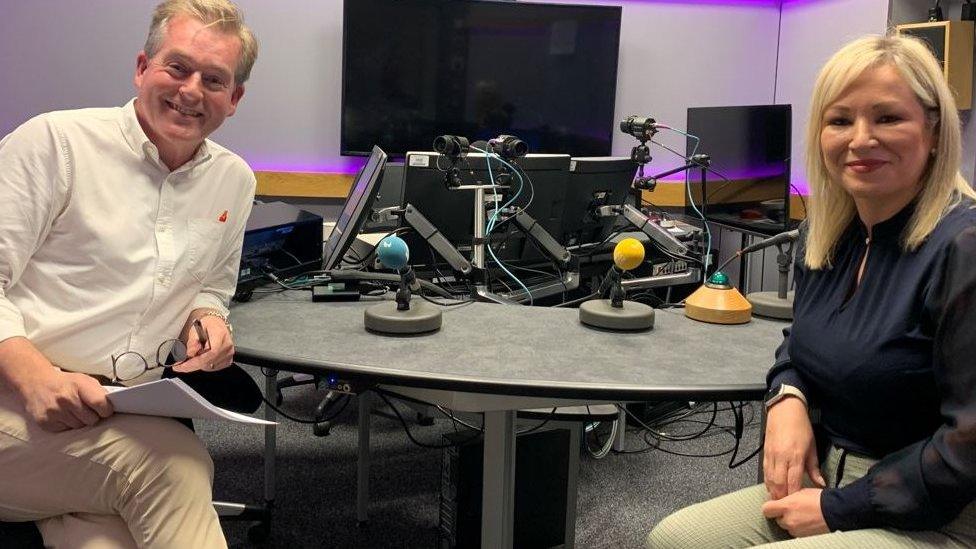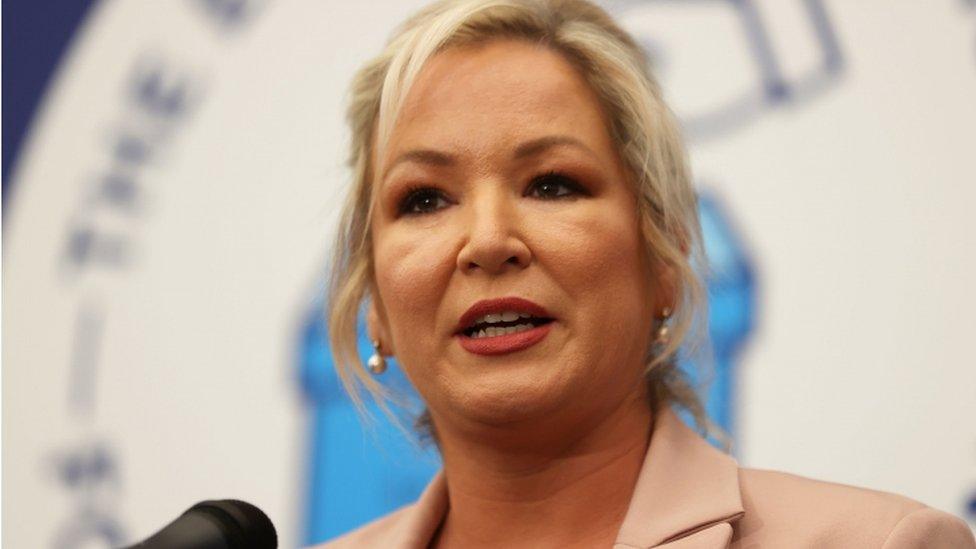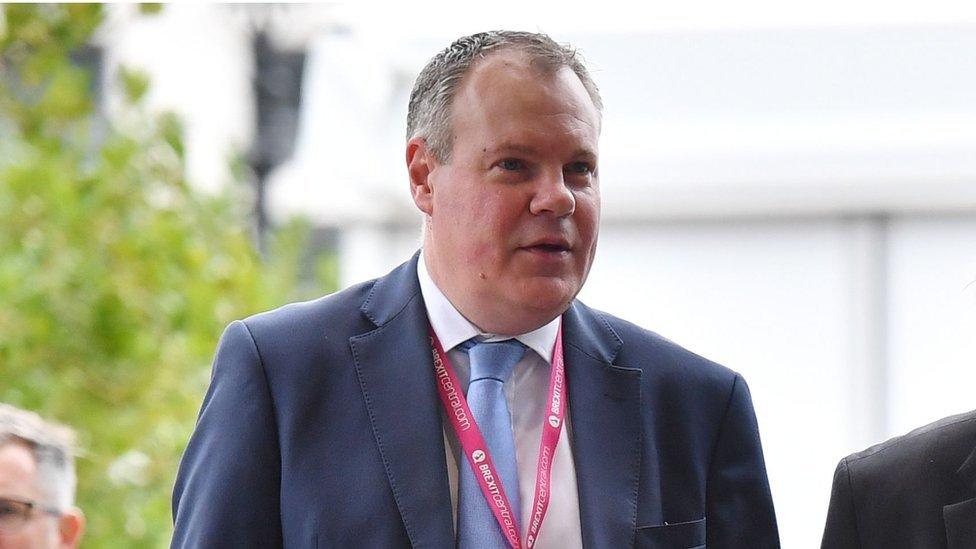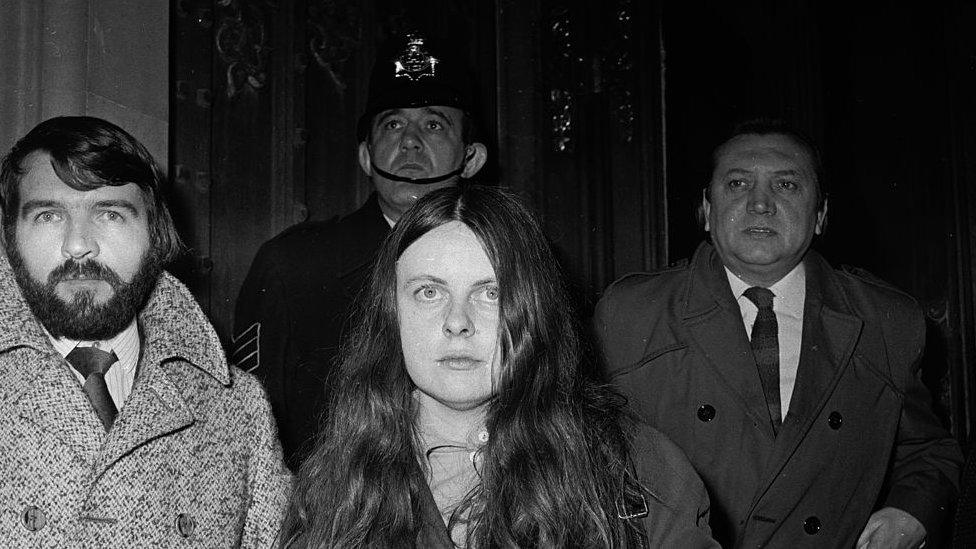Red Lines: Police, Partygate and slapping the home secretary
- Published

Four public figures talk to Mark Carruthers about formative political influences and experiences
Politicians often find themselves under fire for not replying to a straight question with a straight answer - rightly so, as it happens.
But how do things look when the usual high intensity format is changed and the interviewee is given the time and space to be more reflective about his or her worldview?
That's what we've tried to do in a series of four one-on-one conversations for the Red Lines podcast this August- which will also to be broadcast on BBC Radio Ulster.
We've taken four well-known political figures here and asked them to reflect on their formative influences and experiences.
It wasn't easy to settle on just four guests from the many available to us, but in the end we picked people who represent a mix of views and experiences - and they fully bought into our goal of serving up solid, thoughtful, revealing conversations.
In the first programme in the series, the first minister designate, Michelle O'Neill, reflects on how both her late father - a former IRA prisoner and Sinn Féin councillor - and Martin McGuinness shaped her politics.

Michelle O'Neill talks candidly about the teachers who were supportive when she became pregnant at the age of 16
On former deputy first minister Mr McGuinness she says: "I was lucky to have his tutelage for many, many years. He was a huge influence in my life."
She talks candidly about the teachers who were supportive when she became pregnant at the age of 16, though she's critical of the way the school itself treated her at the time and confirms she's never been invited back to address that school community, despite her public position today.
She also reveals details of one event in her teenage years that had a profound impact on her:
"I remember getting my driving licence when I was just 18 - or maybe it was 17 - and I remember being stopped by the local RUC," she says.
"They actually gave me - I'm not sure if it was a fixed penalty notice or a fine - for not wearing a seatbelt whenever I was wearing a seatbelt.
"But the words of those officers to me were: 'It will be your word against ours and we know who is going to come out on top of that.'
"So that's the active discrimination that you lived with... in society in those times."
The Minister of State at the Northern Ireland Office, Conor Burns, is - by his own admission - a complex character.

Conor Burns admits there are members of his family whose politics are very different from his own
He is, after all, a gay, Catholic, unionist, British, Irish and Northern Irish Conservative MP.
In the second Red Lines of the series, Mr Burns admits there are members of his family whose politics are very different from his own.
"There were members of my family who would have been probably very sympathetic to some of the - I hesitate to say it - but, probably, some of them would be sympathetic to the IRA in a way," he says
"Many of them would have been sympathetic to a united Ireland, others took the view that the whole thing was insane and that no place was worth the violence and the murder and the killing and the civic disruption."
He opens up about his close friendships with two prime ministers - the late Margaret Thatcher, whom he came to know well in her later years - and the outgoing office holder Boris Johnson - both of them important influences on his career.
He does concede, though, that his comment about Mr Johnson being "ambushed with a cake" at the height of the Partygate controversy was a big error of judgment on his part.
Slapping the home secretary
At 75, Bernadette McAliskey remains a fascinating interviewee.
She's never been far from the headlines over five decades and in this Red Lines discussion she talks about how she found herself propelled into a Westminster seat at the age of 21, in spite of her reluctance to go down that road.
She vividly relives that infamous occasion in the House of Commons when she slapped the Home Secretary Reginald Maudling - and she remembers fondly the night in 1972 that she went for dinner with Muhammad Ali in Dublin.

Bernadette McAliskey pictured outside the House of Commons after she slapped the home secretary
"He is to this day the most perfect male face I have ever gazed upon", she recalls.
"If there was a more perfect male specimen in the world, I haven't seen it yet."
And finally, we hear from the former Justice Minister Claire Sugden, who is one of Northern Ireland's most successful ever independent politicians.

Claire Sugden talks about the influence of her father and of her political mentor, David McClarty, the former Ulster Unionist MLA
She talks about the influence of her father and of her political mentor, David McClarty, the former Ulster Unionist assembly member- and she takes us into the room to revisit the occasion when Arlene Foster and Martin McGuinness invited her to join the executive in 2016.
She tells me: "I remember Arlene Foster saying to me - 'Claire, what is it you want?'
"I said I wanted to do a good job for the people of Northern Ireland. I said give me that chance - and sadly for me they didn't, because less than nine months later the government collapsed.
"I kept my promise - but sadly they didn't keep theirs."
The four Red Lines programmes will be broadcast on successive Fridays - starting on Friday 5 August - at 17:30 BST straight after Evening Extra.
They will also be available as podcasts on BBC Sounds.